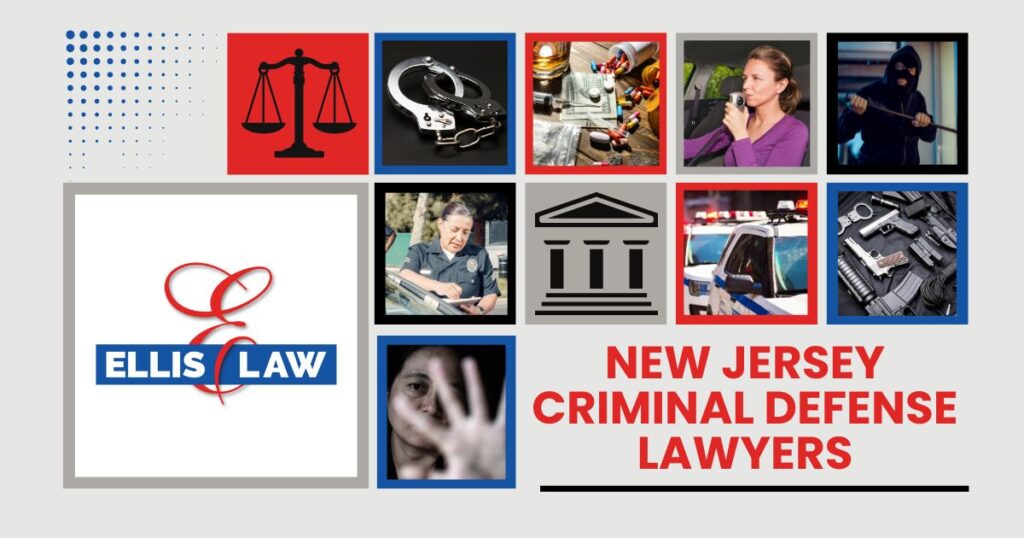New Jersey Criminal Defense Lawyers
If you were charged with a crime, your future depends on a strong criminal defense. There is no such thing as a minor offense when it comes to crime in New Jersey. Anyone accused of a crime is exposed to an array of legal penalties that can have life-changing consequences. A guilty verdict and conviction can follow you for the rest of your life. Even a misdemeanor conviction can affect your future opportunities. In the United States, no other loss is more significant than the loss of freedom and liberty. At Ellis Law, our New Jersey criminal defense lawyers take that responsibility seriously.

Whether you were arrested for a disorderly persons offense or an indictable crime, it is critical to hire an experienced attorney as soon as possible. A knowledgeable criminal defense lawyer will ensure that proper legal procedure is followed while preparing the best possible strategy. When you seek our legal services, you can trust your case is in qualified hands. Our team of criminal defense lawyers will fight to protect your rights and best interests at every step.
What Types of Criminal Cases Do We Handle at Ellis Law?
Our highly-skilled criminal defense lawyers represent clients with a variety of charges involving:
- Carjacking charges
- Child pornography charges
- Criminal sexual contact
- Disarming a law enforcement officer
- Disorderly conduct
- Domestic violence
- Drug charges
- DUI/DWI charges
- Endangering the welfare of a child
- Expungements and bail reductions
- Megan’s Law
- Juvenile crimes
- Property crimes
- Resisting arrest
- Stalking
- Terroristic threats
- Theft charges
- Violent crimes
What is Involved With the Criminal Legal Process?
Drunk driving, assault, robbery, burglary, domestic violence, and murder charges carry serious penalties that can include jail time, fines, and probation. It is vital to have a strong criminal defense lawyer by your side throughout the legal process to better your chances for reduced or dismissed charges.
The criminal legal process involves several stages, including:
- Arraignment
- Discovery and investigation
- Plea bargaining
- Jury trial
- Sentencing
- Appeals
In addition, our criminal defense lawyers have extensive experience representing clients with bench or arrest warrants, at pretrial detention hearings, pre-indictment conferences, plea bargaining and status conferences, pre-trial intervention hearings, and post-conviction relief motions.
Why Choose a New Jersey Criminal Defense Lawyer?
Consulting with a New Jersey criminal defense lawyer as soon as possible after a criminal charge is brought against you is essential. We understand the difficult uphill battles our clients and their loved ones often face. Our dedicated attorneys have the specific experience and knowledge required to effectively handle your criminal case.
Our legal team at Ellis Law has a long-standing history of vigorous advocacy. In addition to substantial financial penalties, clients charged with crimes in New Jersey face consequences that can affect their future and their freedom.
Life-changing consequences that often come with criminal convictions include:
- Employment challenges.
- Acceptance into college.
- Ability to rent or buy property.
- Fractured family relationships.
- Permanent criminal record.
- Reputation in the community.
- Loss of driver’s license.
- Loss of professional licenses.
- Supervised probation.
- Megan’s Law registration.
- Incarceration
What Constitutes a Crime in New Jersey?
When an individual chooses to break the law, they have committed a crime. Even when that person is guilty of the crime, they have a constitutional right to counsel and to be represented by a criminal defense lawyer that will ensure their rights are protected throughout their arrest, trial, and conviction or acquittal.
There are many kinds of crime in New Jersey that carry serious penalties. These include:
- Assault and battery
- Arson
- Auto theft
- Burglary, robbery, armed robbery, and larceny
- Child abuse
- Possession and distribution of child pornography
- Endangering the welfare of a child
- Sex trafficking
- Sexual assault and rape
- Indecent exposure
- Stalking
- Drug possession, manufacturing, and distribution
- Fraud, forgery, counterfeiting, and embezzlement
- Racketeering
- Securities fraud
- Drunk and drugged driving
- Death by auto
- Disorderly conduct
- Domestic violence
- Resisting arrest
- Obstruction of justice
- Insurance fraud
- Identity theft
- Cyber crime
- Illegal possession of a firearm
- Kidnapping
- Murder
- Prostitution and soliciting
- Shoplifting
- Criminal trespassing
- Vandalism
Penalties for these types of crimes can be serious and include jail time, financial penalties, and lifetime inclusion on the National Sex Offender Registry. Background checks completed by potential employers, realtors, educational facilities, and professional institutions will expose the charges and convictions for all offenders.
Defense Strategies and Presumption of Innocence
An experienced and reputable criminal defense lawyer will review the charges against a defendant and design a defense strategy aimed at getting the charges against their client dropped or reduced. In the event the case goes to trial, the criminal defense lawyer will prepare a strong legal strategy to prove their client’s innocence, or to justify their actions.
It is the responsibility of the prosecutor in a criminal case to prove the defendant’s guilt beyond any reasonable doubt. While the defense works to prove their client’s innocence, it is just as important for the defense team to prove that the prosecution did not supply enough evidence against their client to prove they are guilty of the crime.
In some cases, the defendant will have the charges against them dropped if the defense team can convince the prosecution that there is not enough evidence available to prove their client’s guilt. For example, if the defendant is charged with possession of a dangerous substance, such as cocaine, the prosecution will have to show that the defendant knew what the substance was, and that it was illegal to have it in their possession.
In other cases, a defendant may be advised to accept a plea deal offered by the prosecution. When a defendant realizes that there is substantial evidence against them, or that they have no other defense than to plead guilty of a crime, the prosecution may offer a plea deal to avoid the stress, cost, and time involved in taking the case to trial.
A criminal defense lawyer can also ask for a plea bargain if they feel that it is in the best interest of their client. If their client was charged with possession of a dangerous substance, and the defendant has a prior history with possession, use, manufacture, or distribution of the substance, it may be more reasonable to plead guilty in exchange for a reduced sentence. In any criminal case, the defendant has the constitutional right to be presumed innocent until proven guilty beyond a reasonable doubt.
What is an Indictable Crime in New Jersey?
New Jersey breaks crime into three distinct categories.
- Petty Disorderly Persons Offenses
- Disorderly Persons Offenses
- Indictable Crimes, also known as felony crimes in other states
Indictable crimes are broken down into three sub levels:
- Fourth Degree Crimes: Robbery, DUI, forgery, stalking, weapons offenses, possession of marijuana over 50 Grams, and automobile offenses that result in injury
- Third Degree Crimes: Possession of a controlled or dangerous substance, repeat DUI, arson, robbery, and theft above $500, but below $75,000
- Second Degree Crimes: Aggravated arson, sex crimes, drug crimes, white collar crimes, kidnapping, burglary, theft of more than $75,000, and embezzlement
- First Degree Crimes: Manslaughter, murder, rape, drug manufacturing and distribution, armed robbery, and aggravated assault
As the level of crime increases in degree, so do the penalties. An indictable crime in New Jersey carries a minimum sentence of one year in prison. Further sentencing can include:
- First Degree Crimes: This level of crime can be punishable by 10 to 20 years in prison, or 20 to 30 years to life in prison for murder. Fines for this level of crime can be up to $200,000.
- Second Degree Crimes: Convictions for this level can carry a prison sentence between five and 10 years with fines up to $150,000.
- Third Degree Crimes: A fine up to $15,000 and a jail sentence from three to five years can be imposed for this level of crime.
- Fourth Degree Crimes: A prison sentence up to 18 months and a fine up to $10,000 can be handed down for this level of crime.
Presiding judges must follow New Jersey sentencing statutes when deciding what penalties apply to convictions. The judge can also decide whether the defendant will serve their sentence in prison or on probation. Anyone convicted of a first or second-degree crime will serve at least part of their sentence in prison, even if it is their first offense.
What are Misdemeanor Crimes in New Jersey?
A misdemeanor crime in New Jersey is the lowest level of criminal offense. There are several types of crimes that fall into this category:
- Disorderly Persons Offenses: This type of misdemeanor is most often dealt with at the municipal level where the incident happened. It is still wise to consult and be represented by a criminal defense lawyer as penalties at this level can still impose fines of $1,000 and six months in jail. Examples of this type of crime include possession of marijuana under 50 grams, simple assault, harassment, and shoplifting.
- Local Ordinance Violations: Examples of this type of offense include disturbing the peace, littering, loitering, public intoxication, and excessive noise. Violations of this sort are often imposed fines and community service.
- Traffic Violations: Driving on a suspended license, driving under the influence of alcohol or drugs, reckless driving, failure to obey traffic signs or signals, speeding, and failure to yield are the most common types of traffic violations. This level of offense is handled in the municipal court where a judge determines innocence or guilt.
What is Expungement?
Expungement is a legal process where arrest and conviction records are sealed. Individuals no longer must disclose their arrest or conviction to potential employers, real estate agents or landlords, or on any type of financial or professional application. The individual can act as if the actions never occurred.
There are certain restrictions and eligibility requirements attached to expungement. Laws related to expungement vary by state. Individuals interested in getting their arrest or convictions expunged should do the following:
- Contact the police department or county court in the jurisdiction where the arrest or conviction took place to ask about expungement regulations.
- Inquire what crimes and offenses are eligible for expungement in that state. In some states, only misdemeanors are eligible for expungement.
- Find out how much time is required between arrest and conviction before expungement can be offered. In some cases, expungement can only occur after a sentence has been served, including any probation attached to the sentence.
- Find out if the expungement process requires representation by a criminal defense lawyer. In a large majority of states, courts offer a process where the individual seeking expungement can do so by filing a Motion for Expungement form.
- Investigate whether the expungement allows for police department, employers, or licensing boards to access the arrest or conviction records. In some cases, expungement does not prevent these agencies from accessing sealed records.
- See if the state where the arrest and conviction occurred offers a Certificate of Actual Innocence. This legal document confirms that a person’s arrest or conviction was unfounded and that the individual is innocent.
- Investigate whether expungement is available for drug offenses. In a large majority of situations, arrests and convictions can be expunged when drug treatment programs mandated by the court are completed.
- Most juvenile offenders can have their records expunged for convictions that occurred before the age of adulthood. When a juvenile offender turns 18 years of old, their records can be expunged so long as they have maintained a clean record.
Even when the court does not require representation by a criminal defense lawyer, it can be beneficial to take advantage of their services. An experienced criminal lawyer familiar with the laws of the state can ensure that the individual’s legal rights are protected and that their best interests are served. The lawyer can also determine the level of access allowed with the expungement offered, thereby allowing the individual to fully understand how the records may impact their future.
Our New Jersey Criminal Defense Lawyers at Ellis Law Will Fight for Your Rights
If you have been charged with a crime, contact the New Jersey criminal defense lawyers at Ellis Law for a case consultation. We will work hard to remove the charges held against you. For more information, call us today at 888-355-4752 or contact us online. Our office is located in Freehold, New Jersey and we provide services to residents across NY and NJ, including Red Bank, Keyport, Middletown, Neptune, Manasquan, Newark, Toms River, East Brunswick, Jersey City, New York, New York City, The Bronx, Brooklyn, Manhattan, Queens, and Staten Island as well as all of Monmouth County, Ocean County, Middlesex County, Mercer County, Union County, Hunterdon County, Somerset, Essex County, Hudson County, Burlington County and Atlantic County. We speak Spanish, Yiddish, Hebrew, Portuguese and Russian and we are ready to help you.






